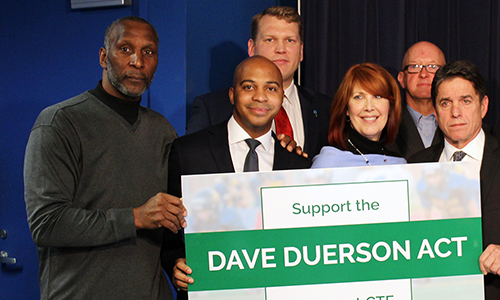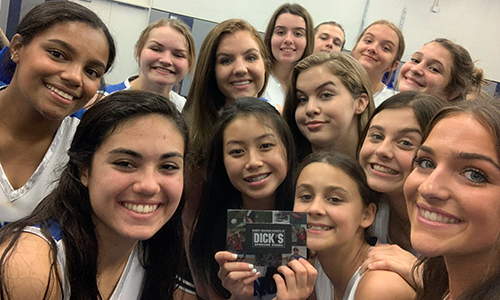GET INVOLVED
Completed Research Studies
FIND-CTE Study
Focused Imaging for the Neurodegenerative Disease Chronic Traumatic Encephalopathy
Location: Study sites in the Boston, MA and San Francisco, CA areas
Seeking: Former NFL players between 45 and 80 years old. Participation will include study visits at one of the two study cites for the FIND-CTE evaluation which includes two positron emission tomography (PET) scans; as well as an Alzheimer's Disease Research Center evaluation including neurological, cognitive, self-report mood and behavior exams; advanced magnetic resonance imaging (MRI) scans; and a collection of blood samples.
Goal: The major goal of the FIND-CTE research project is to develop methods of diagnosing CTE during life, so that interventions can be developed to help those affected by this disease.
Update: FIND-CTE completed recruiting in March 2023 and is no longer accepting new participants.
Molecular Imaging of Brain Injury and Repair in NFL Players
Location: Baltimore
Seeking: Researchers at Johns Hopkins are seeking former NFL players who played for two or more seasons and whose last season was within the last five years. Participants must be between 25 and 40 years old and have no history of psychiatric disease. Qualified participants will undergo a PET scan, an MRI scan, and an optional lumbar puncture. Those completing the study will receive compensation for time and travel to Baltimore.
Goal: The purpose of this study is to track markers of injury and repair, provide data to analyze concussions, determine the severity of the effects, and determine the overall long term health impact on the players.
Update: This study completed recruiting in February 2024 and is no longer accepting new participants.
T.A.N.G.L.E.
Location: Boston
Seeking: Former American football players between the ages of 50 and 70 who have played at least 11 years of American football, including 2 years in college.
Goal: T.A.N.G.L.E. stands for Tau Agent for the Neurodegenerative lesion of CTE. The major goal of this research is to develop methods of diagnosing CTE during life so that interventions can be developed to help those affected by this disease.
Update: This study completed recruiting in April 2024 and is no longer accepting new participants.
Boston University COVID & Cognition Study
BU COVID & Cognition Study
Location: Nationwide
Seeking:
- At least 18 years of age
- Fluent in English
- Access to an Internet-connected smartphone (iOS or Android) or tablet device
- No plan to undergo any major treatments or surgery during the next 6 months
- No diagnosis of dementia, stroke, or major depressive disorder
- No admission to the Intensive Care Unit (ICU) since 2018
- No history of head injury or concussion
Background & Detail:
Many COVID-19 patients experience neurological consequences, such as problems with memory, attention, and brain fog. There is currently a lack of understanding of how COVID-19 impacts neurological functioning, cognition, and mood. Gather more information on the neurocognitive impact of COVID-19 could help develop treatments that aim to produce better outcomes while better characterizing the effects of COVID-19 on the brain.
This project will use mobile-based assessments, including smartphones and tablets, to characterize the neurocognitive effects of COVID-19 with higher precision and frequency than done with traditional neuropsychological testing. We aim to determine whether the cognitive capacity, mood, and sleep patterns of individuals who have ever been infected with COVID-19 is distinguishable from individuals who have never been infected with COVID-19. Having ever been infected with COVID-19 will distinguish the two groups recruited in the study (Group 1: Ever-COVID; Group 2: Never-COVID). The date and reported severity of COVID-19 infection, as well as details related to changes in lifestyle will be recorded to help characterize their recovery trajectory.
The first smartphone application used in this project consists of 7 cognitive tasks and 2 questionnaires, and in total is expected to take around 15 minutes to complete. The second smartphone application used in this project involve assessing cognition through voice and speech elicitation tasks, and is expected to take around 8 minutes to complete. Participants will complete a practice session with the smartphone applications in the presence of a study staff during the remote study visit to ensure they are comfortable using the applications.
Following the remote study visit, participants will be asked to complete one assessment per week on each application for the first 1.5 months (6 weeks) of the study, followed by an additional 6 assessments (at minimum) over the remaining 4.5 months in the study. At the end of the study participation, participants will also be asked to complete a study survey to provide feedback on their experience in the study and use of the smartphone applications. Participants will be eligible to receive gifts cards for completing assessments. A $25 gift card will be mailed to participants following the completion of the first 6 assessments over the course of the first 1.5 months of the study, followed by another $25 gift card if they complete an additional 6 assessments (at minimum) over the remaining 4.5 months of the study.
You May Also Like

Help us raise awareness about concussions, PCS and CTE in your community. Learn how to create positive change by becoming a CLF Champion.
Become a CLF Champion
There are many ways you can help contribute to CLF. See how you can fundraise in your community and beyond to support our work.
Ways to Give